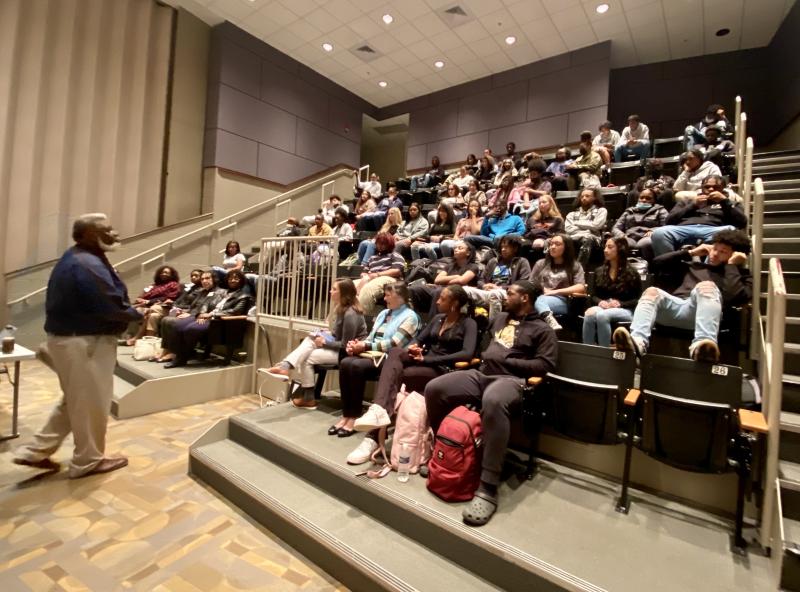First Spouse Tracey Quillen Carney visits Cape High Pathways students

Before introducing First Spouse Tracey Quillien Carney to his students, Cape High Pathways to Success Coordinator William Waters referred to the recent Kentucky Derby, when thoroughbred Rich Strike overcame 80-to-1 odds to win.
A last-minute scratch allowed Rich Strike to enter the derby, Waters said, and the long-shot horse came out of nowhere to surpass all other horses. Even if the probability for success is low, Waters said, it’s not impossible and something magical could happen.
“You never know the chance you're going to give yourself just by taking the chance,” he said.
Pathways to Success Executive Director Fay Blake expanded on the message, telling students to ignore the naysayers. When she asked which students fell off their bikes while learning to ride, hands shot up in the air.
Life is hard, and sometimes you're going to fall down and skin your knees, she said.
“Brush your knees off, pull your shoulders back and get back on the bike,” Blake said. “Get back on the opportunity you are seeking for yourself.”
At the May 10 meeting with Pathways students, Carney said she preferred to be called Tracey or first spouse. The term first lady is straight out of the 1950s, she said, joking that it sounds like the name of a racehorse.
With a little over two years left in her role, Carney encouraged teens to vocalize their needs to school and government officials.
“Speak up and let us know,” she said. “Your voice is the most important voice in communicating what you need.”
Students did not hesitate to use their voices to question Carney, including how Delaware would respond if Roe vs. Wade was overturned by the Supreme Court.
“Delaware has its own law about abortion,” Carney said. “Basically, if the Supreme Court changes course, it will go back to the states, which each have their own laws.”
Abortion is complicated, Carney said, and is a religious, not scientific, issue because it includes a conversation about when there is a soul. People need to make their own decisions on the topic and respect others’ opinions, she said.
“It’s up to you to decide what you think about it,” she said.
Delaware has a law that somewhat protects the right to have abortion, while some states have trigger laws so that if the Supreme Court overturns Roe vs. Wade, abortion automatically becomes illegal in those states, she said.
The problem is, she said, the loudest voices are the extremes on both sides, and probably 80 percent of the population’s voices aren't heard.
“One of the things I’m aware of is political polarization makes kids feel less safe,” Carney said. “This is especially true for little kids, because you're old enough to think through things, but little kids absorb tension that's in the atmosphere and carry it with them in their bodies.”
Citizens need to recognize the price of polarization in society, and try to listen and talk to each other in more civil terms, she said.
Carney said she was dealt a blow as a young child and never addressed the trauma she experienced until years later.
When a student asked her to share how she dealt with the trauma, Carney said she mostly didn't. Her father was badly hurt when she was 10 years old, Carney said. It was not a life-threatening injury, although it felt like it to her, and she thought he got hurt because of a mistake she made.
Because of this, she said, she spent 10 years trying not to make mistakes until she finally addressed her trauma. No one had thought to investigate her experience of the event, she said, so she encouraged students to vocalize their needs.
Pathways to Success provides in-school and after-school mentoring to at-risk youth in participating high schools Cape Henlopen, Sussex Tech, Seaford and Milford. Students remain under Pathways supervision and guidance until one year after graduation. For more information on Pathways to Success, call 302-381-6414 or go to pathways-2-success.org.





















































